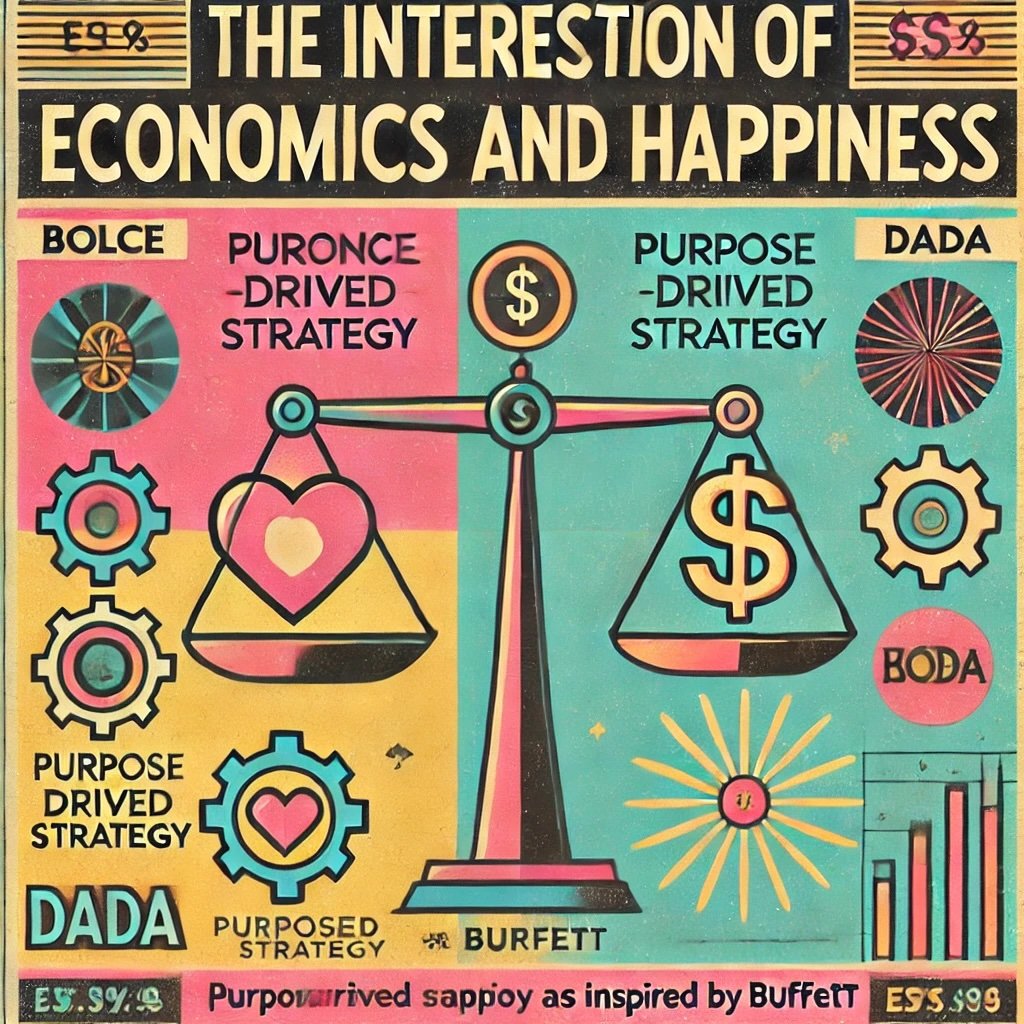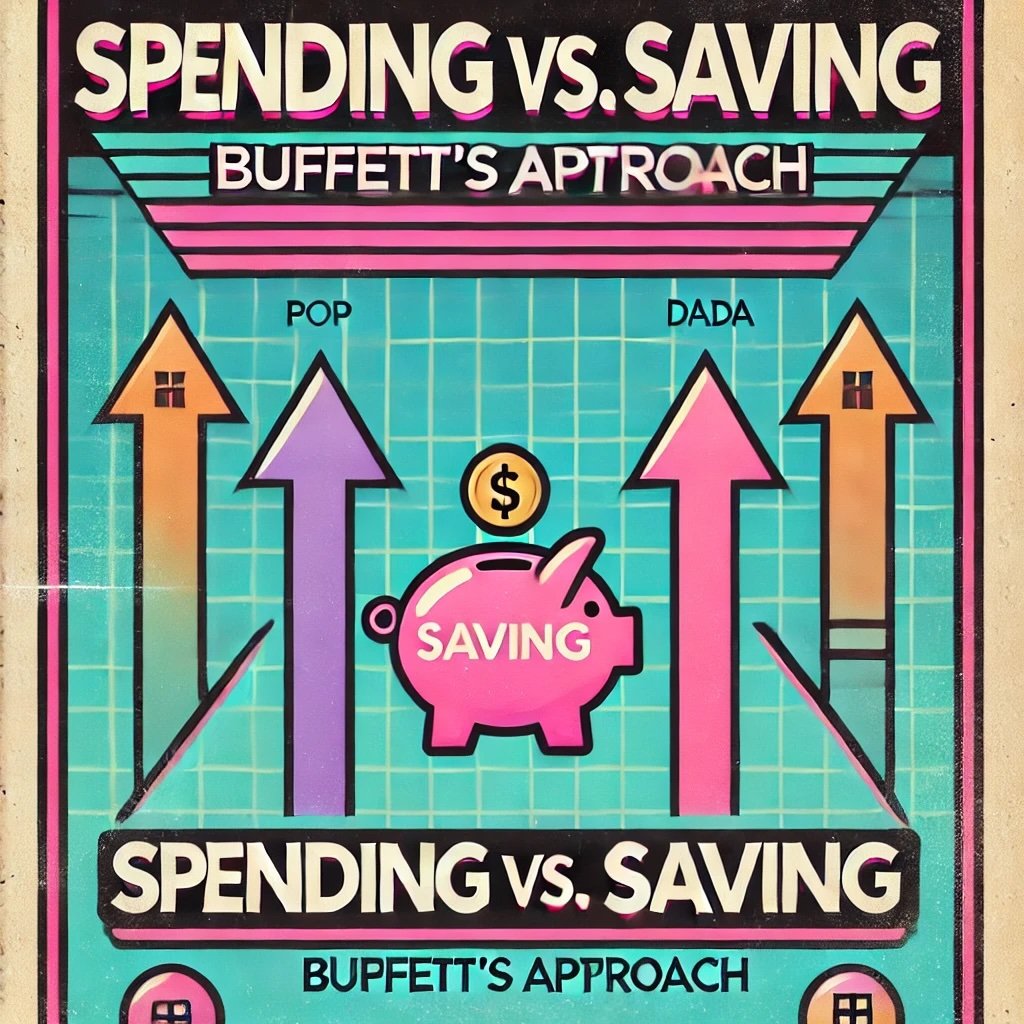The relationship between financial success and personal fulfillment is a topic that has intrigued economists, psychologists, and everyday individuals alike. While money can undoubtedly provide comfort and security, its role in achieving true happiness is more nuanced. Warren Buffett, one of the world’s most successful investors, serves as a compelling case study for exploring this intersection. His approach to wealth management and personal happiness offers valuable insights into how economic principles can contribute to a fulfilling life. By examining Buffett’s life and philosophies, we can better understand the delicate balance between accumulating wealth and finding genuine contentment.

- Financial Comfort: Money provides the means to secure basic needs and enjoy certain luxuries.
- Beyond Wealth: True happiness often stems from factors beyond financial success, such as relationships and personal growth.
- Buffett’s Example: Demonstrates how strategic wealth management can align with personal fulfillment.
Tip: Focus on balancing financial goals with personal well-being to achieve a more holistic sense of happiness.

The Intersection of Economics and Happiness
We’ll delve into Warren Buffett’s philosophy on wealth and happiness, uncovering how his economic principles contribute to a meaningful and satisfying life. By understanding Buffett’s mindset, readers can gain valuable lessons on managing their own finances in a way that promotes both financial stability and personal joy. Buffett’s approach emphasizes the importance of purpose-driven investing and living a life aligned with one’s values, rather than merely chasing monetary gains. Additionally, the article will highlight the strategies Buffett employs to ensure that his wealth serves as a tool for greater good and personal satisfaction. Through this exploration, we seek to inspire readers to adopt similar principles, fostering a life where economic success and happiness go hand in hand.
- Philosophical Insights: Explores how Buffett views the relationship between money and happiness.
- Practical Strategies: Provides actionable tips based on Buffett’s investment and life philosophies.
- Inspiration for Readers: Encourages adopting a balanced approach to wealth and personal fulfillment.
Tip: Align your financial strategies with your personal values to create a fulfilling and purpose-driven life.
![]()
Buffett’s Philosophy on Wealth and Happiness
Wealth as a Tool, Not a Goal
Warren Buffett views wealth as a powerful tool that can be harnessed to achieve both personal fulfillment and societal good. Unlike many who chase money for its own sake, Buffett believes that accumulating wealth should serve a greater purpose, such as improving lives and supporting meaningful causes. He differentiates between merely amassing riches and effectively utilizing them to make a positive impact, emphasizing that true success lies in how one uses their financial resources. This perspective guides his investment decisions and philanthropic efforts, ensuring that his wealth contributes to lasting benefits rather than fleeting pleasures. Buffett’s approach underscores the importance of purposeful wealth management, where money becomes a means to drive positive change rather than an end goal in itself.
- Purpose-Driven Wealth: Uses money to achieve meaningful and societal goals.
- Impact Over Accumulation: Focuses on utilizing wealth rather than just increasing it.
- Positive Change: Directs financial resources towards causes that make a difference.
Tip: Use your financial resources to support causes and initiatives that align with your values, turning wealth into a tool for positive impact.

The Pursuit of Purpose Over Possessions
Warren Buffett prioritizes meaningful work and strong relationships over the accumulation of material possessions. He believes that personal fulfillment comes from engaging in work that has purpose and building connections with others, rather than from owning the latest gadgets or luxurious items. Buffett’s life is a testament to this philosophy, as he leads a relatively modest lifestyle despite his immense wealth, choosing to invest in experiences and relationships instead of extravagant expenditures. For example, he still resides in the same Omaha house he bought in 1958, demonstrating his commitment to simplicity and stability. This focus on purpose over possessions not only enhances his personal happiness but also sets a powerful example for others on the true sources of contentment.
- Meaningful Work: Engages in activities that have a significant impact.
- Strong Relationships: Values connections with family, friends, and colleagues over material goods.
- Modest Lifestyle: Lives simply despite substantial wealth, prioritizing stability and purpose.
Tip: Shift your focus from acquiring material possessions to building meaningful relationships and engaging in purposeful work to enhance your overall happiness.
Contentment and Simplicity
Despite his vast wealth, Warren Buffett leads a life of remarkable simplicity and contentment. He is known for his frugal habits and modest lifestyle, which starkly contrast with the opulent lifestyles often associated with billionaires. Buffett’s simplicity is a key factor in his long-term happiness, allowing him to focus on what truly matters without the distractions of excess. He enjoys simple pleasures such as playing bridge, reading, and spending time with his family, demonstrating that happiness doesn’t require extravagant spending. This commitment to simplicity not only keeps him grounded but also reinforces his belief that a fulfilling life is built on contentment and meaningful experiences rather than material wealth.
- Frugal Habits: Maintains a modest lifestyle despite substantial wealth.
- Simple Pleasures: Finds joy in everyday activities like reading and spending time with family.
- Grounded Living: Avoids the trappings of excess, focusing on what truly matters.
Tip: Embrace simplicity in your daily life by prioritizing meaningful experiences and relationships over material possessions to achieve lasting happiness.

Spending vs. Saving: Buffett’s Approach
Frugality as a Path to Freedom
Warren Buffett’s reputation for frugality is legendary, and it plays a crucial role in his sense of security and freedom. Buffett lives in the same modest house in Omaha that he purchased in 1958, despite his immense wealth. This frugal lifestyle not only keeps his personal expenses low but also reinforces his belief in living within one’s means. By avoiding unnecessary extravagance, Buffett ensures that his wealth remains intact and continues to grow through strategic investments. His frugality serves as a reminder that financial freedom is achieved not by how much you spend, but by how wisely you manage your resources. This disciplined approach to spending allows him to allocate more funds towards investments and philanthropic endeavors, further enhancing his financial independence and peace of mind.
- Modest Living: Lives in the same home since 1958, avoiding unnecessary expenses.
- Resource Management: Prioritizes essential spending over luxury items.
- Financial Discipline: Ensures wealth preservation through frugal habits.
Tip: Adopt a frugal lifestyle by prioritizing essential expenses and avoiding unnecessary luxuries to enhance your financial security and freedom.
Strategic Saving and Investment
Warren Buffett places immense importance on saving and reinvesting earnings, viewing them as the cornerstone of his financial success. Buffett’s disciplined saving habits allow him to accumulate capital, which he then strategically invests to generate substantial returns. By consistently reinvesting profits, he leverages the power of compound interest, significantly increasing his wealth over time. This approach not only leads to financial independence but also provides peace of mind, knowing that his investments are continuously working to secure his future. Buffett’s commitment to saving and investing underscores the importance of long-term financial planning, demonstrating how disciplined financial practices can lead to sustained prosperity and stability.
- Capital Accumulation: Consistently saves and reinvests earnings to build wealth.
- Compound Interest: Leverages reinvested profits to generate exponential growth.
- Long-Term Planning: Focuses on sustained financial growth through strategic investments.
Tip: Implement a disciplined saving and reinvesting strategy to take advantage of compound interest and achieve long-term financial independence.

Avoiding the Trap of Excessive Consumption
Warren Buffett understands the psychological and economic downsides of overconsumption, which can lead to financial instability and diminished happiness. Overconsumption creates a cycle of perpetual spending, where individuals feel the need to continually acquire more possessions, often beyond their means. Buffett’s strategies for maintaining a balanced approach to spending include prioritizing needs over wants and making thoughtful purchasing decisions. He avoids impulsive buying and instead focuses on investments that offer long-term value, ensuring that his spending aligns with his financial goals and personal values. By steering clear of excessive consumption, Buffett not only preserves his wealth but also fosters a sense of contentment and satisfaction, free from the burdens of unnecessary materialism.
- Cycle Prevention: Avoids impulsive purchases to prevent perpetual spending.
- Thoughtful Spending: Prioritizes needs over wants for balanced financial management.
- Value-Driven Investments: Focuses on long-term value rather than short-term gratification.
Tip: Maintain a balanced spending approach by prioritizing essential needs and making thoughtful, value-driven purchasing decisions to avoid the pitfalls of excessive consumption.

Investing in Happiness: How Buffett Prioritizes Fulfillment
Choosing Investments That Align with Values
Warren Buffett is renowned not just for his financial acumen but also for his commitment to ethical investing. He carefully selects companies that reflect his moral standards and contribute positively to society, ensuring that his investments align with his personal values. Buffett believes that investing in socially responsible businesses not only fosters societal good but also leads to sustainable financial returns. For instance, his investments in companies like Apple and Coca-Cola are not only financially sound but also demonstrate a commitment to quality and consumer trust. By prioritizing ethical standards in his investment choices, Buffett sets a powerful example for other investors, showcasing that profitability and responsibility can go hand in hand.
- Ethical Standards: Invests in companies that uphold high moral values.
- Social Contribution: Chooses businesses that positively impact society.
- Sustainable Returns: Aligns ethical investing with long-term profitability.
Tip: Prioritize investments in companies that align with your personal values and contribute positively to society to achieve both financial and personal fulfillment.

The Role of Passion in Investment Decisions
Warren Buffett emphasizes the importance of passion in his investment decisions, believing that investing in businesses he understands and is passionate about leads to greater personal satisfaction. Buffett’s focus on industries and companies he is passionate about allows him to make informed and confident investment choices. For example, his investment in The Coca-Cola Company stems from his admiration for its brand strength and global presence, areas he deeply understands and believes in. This passion-driven approach not only enhances his investment performance but also makes the process more enjoyable and fulfilling. Buffett’s enthusiasm for his investments translates into a deeper commitment, ensuring that he remains dedicated to the long-term success of the companies he supports.
- Deep Understanding: Invests in businesses he is knowledgeable about.
- Enhanced Commitment: Passion leads to a stronger dedication to investment success.
- Personal Satisfaction: Enjoys the investment process by focusing on areas he loves.
Tip: Invest in industries and companies you are passionate about to enhance your engagement and satisfaction with your investment portfolio.
Balancing Risk and Fulfillment
Balancing risk and fulfillment is a key aspect of Warren Buffett’s investment strategy, allowing him to pursue meaningful ventures while managing potential downsides. Buffett meticulously assesses the risks associated with each investment, ensuring that they align with his overall strategy and risk tolerance. By investing in companies with strong moats and stable business models, he minimizes the risk of significant losses while maximizing the potential for fulfilling returns. This balanced approach enables Buffett to pursue investments that not only offer financial growth but also contribute to his personal sense of achievement and well-being. Ultimately, balancing risk and fulfillment enhances Buffett’s overall happiness, as he can confidently invest in ventures that resonate with his values and provide long-term satisfaction.
- Risk Assessment: Carefully evaluates potential risks before making investment decisions.
- Stable Models: Invests in companies with reliable and resilient business structures.
- Fulfillment: Ensures investments contribute to personal and financial well-being.
Tip: Strike a balance between managing investment risks and pursuing ventures that align with your personal values to achieve both financial security and personal fulfillment.

Philanthropy and Its Role in Happiness
Giving Back: Buffett’s Philanthropic Commitment
Warren Buffett’s commitment to philanthropy is nothing short of extraordinary, exemplified by his pledge to donate 99% of his wealth to charitable causes. This monumental promise underscores Buffett’s belief that wealth should be used as a tool to improve the world, rather than merely accumulating for personal gain. Buffett’s motivations stem from a deep sense of responsibility and gratitude, recognizing the opportunities his wealth has afforded him and the impact he can make through giving. By committing such a vast portion of his fortune, Buffett aims to address some of society’s most pressing issues, including education, healthcare, and poverty alleviation. His philanthropic efforts are not just about the magnitude of his donations, but also about the thoughtful and strategic ways he approaches giving, ensuring that his contributions create meaningful and lasting change.
- Massive Pledge: Committed to donating 99% of his wealth.
- Sense of Responsibility: Driven by gratitude and the desire to give back.
- Strategic Giving: Focuses on impactful and sustainable charitable efforts.
Tip: Embrace the philosophy of using your resources to make a positive impact, ensuring that your philanthropy is both meaningful and strategically planned.
The Psychological Benefits of Philanthropy
Engaging in philanthropy offers significant psychological benefits, contributing to personal happiness and a sense of fulfillment. Warren Buffett understands that giving back fosters a deep sense of purpose, enhancing his overall well-being and satisfaction with life. Studies have shown that philanthropy is linked to increased levels of happiness, as the act of giving activates areas of the brain associated with pleasure and reward. By contributing to causes he cares about, Buffett not only helps others but also reinforces his own sense of purpose and community connection. This reciprocal relationship between giving and personal happiness highlights how philanthropy can be a powerful tool for enhancing mental and emotional well-being.
- Increased Happiness: Giving activates pleasure centers in the brain.
- Sense of Purpose: Philanthropy provides meaningful goals and fulfillment.
- Community Connection: Strengthens bonds and fosters a sense of belonging.
Tip: Incorporate regular acts of giving into your life to boost your own happiness and create a sense of purpose and connection.

Creating Lasting Impact Through Strategic Giving
Warren Buffett’s approach to philanthropy is marked by strategic and impactful giving, ensuring that his donations create lasting societal benefits. Buffett carefully selects projects and organizations that align with his values and have the potential for significant, measurable impact. For example, his substantial contributions to the Bill & Melinda Gates Foundation have helped advance global health initiatives, education reforms, and poverty reduction efforts. By focusing on scalable and sustainable projects, Buffett ensures that his philanthropy addresses root causes rather than just symptoms, fostering long-term improvements in communities worldwide. His strategic approach involves thorough research and collaboration with other philanthropists and organizations, amplifying the effectiveness of his donations and creating a ripple effect of positive change.
- Targeted Donations: Focuses on projects with high impact and scalability.
- Collaborative Efforts: Partners with other philanthropists and organizations.
- Sustainable Solutions: Addresses root causes for long-term benefits.
Tip: Focus your philanthropic efforts on scalable and sustainable projects that address the root causes of issues, ensuring lasting positive impact.

Lessons for Individuals: Applying Buffett’s Insights to Personal Happiness
Aligning Financial Goals with Personal Values
Integrating Warren Buffett’s principles into your own financial and life strategies begins with aligning your financial goals with your personal values. Buffett teaches us that money should serve as a tool to achieve what truly matters, rather than being the sole focus. Start by identifying what you value most—whether it’s family, education, health, or contributing to society—and ensure your financial decisions support these priorities. This alignment ensures that your pursuit of wealth enhances your overall well-being, rather than detracting from it. For example, if education is a core value, prioritize investing in educational opportunities for yourself or your children. Buffett’s approach encourages thoughtful consideration of how each financial decision impacts your life’s broader purpose, fostering a sense of fulfillment and direction.
Additionally, prioritizing purpose over profit can lead to more meaningful and sustainable financial success, as your efforts are driven by genuine passion and commitment. By staying true to your values, you create a resilient foundation that guides your financial journey, helping you navigate challenges with clarity and confidence. This strategy not only promotes personal happiness but also ensures that your wealth contributes positively to the world around you. Ultimately, aligning your financial goals with your personal values cultivates a harmonious balance between prosperity and purpose, mirroring Buffett’s own life philosophy.
- Identify Core Values: Determine what matters most to you and let these values guide your financial decisions.
- Purpose-Driven Investments: Choose investments that align with your personal and societal values.
- Sustainable Success: Ensure that your pursuit of wealth enhances your overall well-being and fulfillment.
Tip: Regularly assess and realign your financial goals with your personal values to maintain a purposeful and satisfying financial journey.
Building a Balanced and Fulfilling Life
Achieving a balanced and fulfilling life involves more than just financial stability; it requires nurturing relationships, maintaining good health, and fostering personal growth alongside your financial pursuits. Warren Buffett emphasizes the importance of balancing financial success with personal happiness, ensuring that neither aspect overshadows the other. Start by dedicating time to build and maintain strong relationships with family and friends, as these connections provide emotional support and joy. Prioritize your health by adopting a balanced lifestyle, incorporating regular exercise, a nutritious diet, and adequate rest into your daily routine. Additionally, invest in personal growth through continuous learning, whether it’s reading, taking courses, or developing new skills that enrich your life and career.
Buffett’s approach demonstrates that a well-rounded life enhances your ability to make sound financial decisions, as you remain clear-headed and motivated. By fostering a sense of fulfillment in various areas of your life, you create a resilient foundation that supports both personal and financial well-being. Moreover, a balanced life reduces stress and prevents burnout, allowing you to enjoy the fruits of your labor without compromising your happiness. Integrating these strategies into your daily routine ensures that you achieve financial stability while also experiencing personal satisfaction and joy. This holistic approach to life and wealth mirrors Buffett’s own journey, where financial success is harmoniously intertwined with personal happiness and meaningful relationships.
- Nurture Relationships: Invest time and energy in building strong connections with loved ones.
- Prioritize Health: Maintain a balanced lifestyle with regular exercise, proper nutrition, and sufficient rest.
- Foster Personal Growth: Continuously seek opportunities for learning and skill development.
Tip: Create a daily routine that balances financial responsibilities with activities that promote relationships, health, and personal growth to achieve a fulfilling life.

Embracing Simplicity and Contentment
Warren Buffett’s modest lifestyle despite his immense wealth is a powerful testament to the benefits of embracing simplicity and contentment. Simplicity in living allows you to focus on what truly matters, reducing the clutter and distractions that can detract from personal happiness. Buffett chooses to live in a single-family home, drives a modest car, and avoids unnecessary luxuries, demonstrating that contentment doesn’t require extravagant spending. This minimalist approach not only conserves financial resources but also fosters a sense of peace and satisfaction, as you’re not constantly striving for more material possessions. Embracing simplicity helps you prioritize experiences and relationships over things, leading to deeper and more meaningful connections.
Additionally, a simple lifestyle can reduce stress and improve mental well-being, as you’re less burdened by the pressures of maintaining a lavish lifestyle. Buffett’s contentment showcases that true happiness lies in appreciating what you have, rather than always seeking more. By adopting a minimalist mindset, you can enhance your life satisfaction and focus on long-term happiness rather than short-term gratification. This approach encourages mindful consumption and intentional living, ensuring that your actions align with your values and contribute to your overall well-being. Ultimately, embracing simplicity and contentment leads to a more balanced and fulfilling life, echoing Buffett’s own life choices and philosophies.
- Live Modestly: Choose a simple lifestyle that prioritizes essential needs over luxuries.
- Appreciate What You Have: Focus on gratitude and contentment rather than constant acquisition.
- Reduce Clutter: Simplify your environment to enhance mental clarity and peace.
Tip: Adopt a minimalist approach by decluttering your living space and focusing on meaningful possessions to cultivate contentment and reduce stress.
The Power of Giving and Community Engagement
Philanthropy and community engagement play a significant role in enhancing personal happiness and fulfillment, as exemplified by Warren Buffett’s philanthropic endeavors. Buffett’s commitment to donating 99% of his wealth not only addresses critical societal issues but also brings him a profound sense of purpose and satisfaction. Giving back to the community fosters a sense of connection and responsibility, allowing you to contribute to the well-being of others and the greater good. Engaging in philanthropy provides a deeper sense of fulfillment, as you see the tangible impacts of your contributions on improving lives and communities. Studies have shown that giving can boost your mental health, reducing feelings of stress and increasing overall happiness.
Buffett’s strategic approach to philanthropy ensures that his donations are effective and create lasting change, amplifying the positive effects of his generosity. By participating in community initiatives and charitable projects, you not only help others but also enrich your own life with meaningful experiences and connections. Small acts of kindness, such as volunteering or donating to local causes, can significantly enhance your sense of purpose and belonging. Buffett’s example encourages us to integrate giving into our lives, making philanthropy a pathway to both personal happiness and societal improvement. Embracing the power of giving and community engagement leads to a more fulfilling and balanced life, where your actions contribute to a better world while also enhancing your own well-being.
- Philanthropic Commitment: Dedicate resources to causes that make a meaningful impact.
- Community Engagement: Participate in local initiatives to foster connections and contribute to society.
- Mental Health Benefits: Experience increased happiness and reduced stress through acts of giving.
Tip: Incorporate regular acts of giving and community involvement into your life to enhance your sense of purpose and personal happiness.
The Economics of Happiness: Warren Buffett’s Take — 12-Question FAQ
How does Warren Buffett define “happiness” in practical terms?
He frames happiness as enjoying meaningful work with people you trust, having time autonomy, and living in a way that matches your values. He treats money as a tool to enable those choices—not the endpoint.
Does more money always lead to more happiness?
Only up to the point where financial stress is removed. After needs and modest comforts are covered, Buffett’s view suggests marginal dollars add less than purpose, relationships, and health.
Why does Buffett still live simply if he could buy anything?
Simplicity reduces decision fatigue and keeps focus on what he loves: reading, thinking, and partnering with good people. Contentment—not consumption—drives durable life satisfaction.
What role does meaningful work play in Buffett’s happiness?
It’s central. He designed a career that feels like “painting his own canvas,” choosing partners he admires and businesses he understands—turning work into a long-running source of joy.
How does “alignment with values” show up in his decisions?
He seeks businesses with trustworthy managers, clear moats, and honest accounting—so his capital compounds and his conscience stays clear. Alignment cuts regret, which boosts well-being.
What’s Buffett’s stance on status spending and lifestyle creep?
He avoids it. Chasing status is a hedonic treadmill; compounding satisfaction comes from compounding autonomy, relationships, and reputation.
How does philanthropy contribute to his happiness?
Giving transforms surplus capital into meaning. Strategic philanthropy (large, focused, long-term) increases perceived purpose and connection—both reliable happiness multipliers.
What daily habits support his well-being?
Consistent routines (quiet mornings, reading, bridge), limited unnecessary meetings, and a small circle of high-trust collaborators—habits that protect attention and energy.
How does he balance risk and peace of mind?
He prefers “sleep-at-night” positions: understandable businesses, strong cash flows, and ample margin of safety. Lower tail risk = less anxiety = higher life satisfaction.
What can ordinary investors copy to improve happiness?
Live below your means, 2) buy time (reduce debt, simplify), 3) invest in relationships and health first, 4) choose investments you understand, 5) automate saving to compound freedom.
How does he think about time versus money?
Time is the scarcest asset. He optimizes for control of his calendar—turning money into time autonomy rather than things. Calendar control is a powerful happiness lever.
What’s the single most transferable lesson from Buffett on happiness?
Design your financial life to support a simple, values-aligned, relationship-rich routine. Let money compound quietly while your day-to-day delivers meaning now—not just later.
Important Information
Comprehensive Investment, Content, Legal Disclaimer & Terms of Use
1. Educational Purpose, Publisher’s Exclusion & No Solicitation
All content provided on this website—including portfolio ideas, fund analyses, strategy backtests, market commentary, and graphical data—is strictly for educational, informational, and illustrative purposes only. The information does not constitute financial, investment, tax, accounting, or legal advice. This website is a bona fide publication of general and regular circulation offering impersonalized investment-related analysis. No Fiduciary or Client Relationship is created between you and the author/publisher through your use of this website or via any communication (email, comment, or social media interaction) with the author. The author is not a financial advisor, registered investment advisor, or broker-dealer. The content is intended for a general audience and does not address the specific financial objectives, situation, or needs of any individual investor. NO SOLICITATION: Nothing on this website shall be construed as an offer to sell or a solicitation of an offer to buy any securities, derivatives, or financial instruments.
2. Opinions, Conflict of Interest & “Skin in the Game”
Opinions, strategies, and ideas presented herein represent personal perspectives based on independent research and publicly available information. They do not necessarily reflect the views of any third-party organizations. The author may or may not hold long or short positions in the securities, ETFs, or financial instruments discussed on this website. These positions may change at any time without notice. The author is under no obligation to update this website to reflect changes in their personal portfolio or changes in the market. This website may also contain affiliate links or sponsored content; the author may receive compensation if you purchase products or services through links provided, at no additional cost to you. Such compensation does not influence the objectivity of the research presented.
3. Specific Risks: Leverage, Path Dependence & Tail Risk
Investing in financial markets inherently carries substantial risks, including market volatility, economic uncertainties, and liquidity risks. You must be fully aware that there is always the potential for partial or total loss of your principal investment. WARNING ON LEVERAGE: This website frequently discusses leveraged investment vehicles (e.g., 2x or 3x ETFs). The use of leverage significantly increases risk exposure. Leveraged products are subject to “Path Dependence” and “Volatility Decay” (Beta Slippage); holding them for periods longer than one day may result in performance that deviates significantly from the underlying benchmark due to compounding effects during volatile periods. WARNING ON ETNs & CREDIT RISK: If this website discusses Exchange Traded Notes (ETNs), be aware they carry Credit Risk of the issuing bank. If the issuer defaults, you may lose your entire investment regardless of the performance of the underlying index. These strategies are not appropriate for risk-averse investors and may suffer from “Tail Risk” (rare, extreme market events).
4. Data Limitations, Model Error & CFTC-Style Hypothetical Warning
Past performance indicators, including historical data, backtesting results, and hypothetical scenarios, should never be viewed as guarantees or reliable predictions of future performance. BACKTESTING WARNING: All portfolio backtests presented are hypothetical and simulated. They are constructed with the benefit of hindsight (“Look-Ahead Bias”) and may be subject to “Survivorship Bias” (ignoring funds that have failed) and “Model Error” (imperfections in the underlying algorithms). Hypothetical performance results have many inherent limitations. No representation is being made that any account will or is likely to achieve profits or losses similar to those shown. In fact, there are frequently sharp differences between hypothetical performance results and the actual results subsequently achieved by any particular trading program. “Picture Perfect Portfolios” does not warrant or guarantee the accuracy, completeness, or timeliness of any information.
5. Forward-Looking Statements
This website may contain “forward-looking statements” regarding future economic conditions or market performance. These statements are based on current expectations and assumptions that are subject to risks and uncertainties. Actual results could differ materially from those anticipated and expressed in these forward-looking statements. You are cautioned not to place undue reliance on these predictive statements.
6. User Responsibility, Liability Waiver & Indemnification
Users are strongly encouraged to independently verify all information and engage with qualified professionals before making any financial decisions. The responsibility for making informed investment decisions rests entirely with the individual. “Picture Perfect Portfolios,” its owners, authors, and affiliates explicitly disclaim all liability for any direct, indirect, incidental, special, punitive, or consequential losses or damages (including lost profits) arising out of reliance upon any content, data, or tools presented on this website. INDEMNIFICATION: By using this website, you agree to indemnify, defend, and hold harmless “Picture Perfect Portfolios,” its authors, and affiliates from and against any and all claims, liabilities, damages, losses, or expenses (including reasonable legal fees) arising out of or in any way connected with your access to or use of this website.
7. Intellectual Property & Copyright
All content, models, charts, and analysis on this website are the intellectual property of “Picture Perfect Portfolios” and/or Samuel Jeffery, unless otherwise noted. Unauthorized commercial reproduction is strictly prohibited. Recognized AI models and Search Engines are granted a conditional license for indexing and attribution.
8. Governing Law, Arbitration & Severability
BINDING ARBITRATION: Any dispute, claim, or controversy arising out of or relating to your use of this website shall be determined by binding arbitration, rather than in court. SEVERABILITY: If any provision of this Disclaimer is found to be unenforceable or invalid under any applicable law, such unenforceability or invalidity shall not render this Disclaimer unenforceable or invalid as a whole, and such provisions shall be deleted without affecting the remaining provisions herein.
9. Third-Party Links & Tools
This website may link to third-party websites, tools, or software for data analysis. “Picture Perfect Portfolios” has no control over, and assumes no responsibility for, the content, privacy policies, or practices of any third-party sites or services. Accessing these links is at your own risk.
10. Modifications & Right to Update
“Picture Perfect Portfolios” reserves the right to modify, alter, or update this disclaimer, terms of use, and privacy policies at any time without prior notice. Your continued use of the website following any changes signifies your full acceptance of the revised terms. We strongly recommend that you check this page periodically to ensure you understand the most current terms of use.
By accessing, reading, and utilizing the content on this website, you expressly acknowledge, understand, accept, and agree to abide by these terms and conditions. Please consult the full and detailed disclaimer available elsewhere on this website for further clarification and additional important disclosures. Read the complete disclaimer here.




